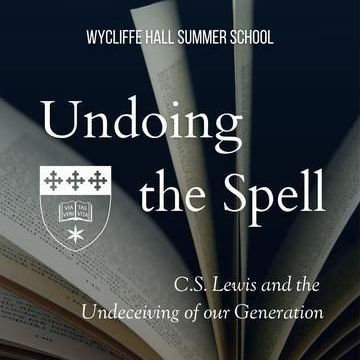The Lens of the Cross: A Sermon on 2 Corinthians 5
A sermon preached at the morning services of traditional worship at St. Martin's Episcopal Church, Houston, on March 30th, 2025.
**The full sermon is also available to watch here, beginning at 29:15.**
A very English perspective
In July of 2012, in a conference centre in Northampton, England, I met my Texan husband. The conference was a four day long gathering of academics: theologians and biblical scholars. The first evening I went back to my room which I was sharing with a friend and I said to her, “Have you met this guy, Steve?” I wasn’t a fan and used words such as “loud” and “irritating” to describe what I thought of him. In a room full of mostly British academics, this particular Texan had stood out.
But that was just the first day. By the end of the four days, my opinion had changed somewhat. Words like “kind” and “honest” were more likely descriptors by then. And to cut a longer story short, 11 months later we were married.
I don’t know if I was looking at him from a human point of view when we first met, but it was certainly from a very specific English perspective. Thankfully, that initial judgment didn’t last.
“All that glitters is not gold”
In the play The Merchant of Venice, Portia is a young, wealthy heiress. In anticipation of his death, her father sets up a test for any prospective suitor who might want to wed his daughter. Any prospective suitors are to choose one of three caskets: one of gold, one of silver and one of lead. Inside the right casket would be a picture of Portia and should that box be chosen, the suitor would secure her hand in marriage.
The Prince of Morocco was one such suitor who came to try and win Portia for his wife. Of the three options available, he chose the golden casket. The one with the most extravagance and value. But, on opening the box, he did not find Portia’s picture, but a scroll which read:
All that glitters is not gold—
Often have you heard that told.
Many a man his life hath sold
But my outside to behold.
Gilded tombs do worms infold.
Had you been as wise as bold,
Young in limbs, in judgment old,
Your answer had not been enscrolled.
Fare you well, your suit is cold.
The Prince made his choice on the basis of the opulent exterior of the golden casket. He mistakenly was swayed by the visual. The exterior, and what it signified.
You probably know the rest of the story, or at least can anticipate it by now—not only was it not the gold casket, neither was it the silver one. The winning box was the one made of uninviting lead. That would secure Portia’s hand.
Whether we’re talking about wealth and aesthetics and the allure of a golden box or personality traits and cultural differences at an academic conference: we make distinctions about people and situations. Part of life includes assessing the data, either consciously or subconsciously, and then making decisions about how we will respond.
A radical shift in perspective: all have died
But Paul, in his second letter to the Corinthians, writes that being in Christ, being a follower of Jesus, means a radical change from this perspective. In chapter 5 verse 16 he writes
“From now on, therefore, we regard no one from a human point of view; even though we once knew Christ from a human point of view, we know him no longer in that way.”
We no longer regard anyone from a human point of view. A radical change in the way we look at other people. Rather than old ways of making judgements, now we are to see others a very different way: through a divine lens, namely the death of Jesus. The lens of the Cross.
What does that mean?
Well, that means not seeing people in terms of being more successful or less successful, or more attractive versus less attractive, but beginning with the simple truth that Christ has died for all, because all of us are dead to our sin. All of us are powerless to change the spiritual disease we share. What somebody has or does not have, where someone is from or is not from, makes not one iota of difference to this simple truth. In reality, the more we have, the more we can dress ourselves and our lives up in certain ways, the more we deceive ourselves from who we truly are.
And Christ died for all so that anyone who recognizes their spiritual powerlessness might live. We who were dead might begin again. Whoever is in Christ, gets to be part of that new creation. A new creation that has different priorities, different values, and a whole different way of being, bound together through Jesus’ death and resurrection.
Paul himself had gone through this radical change of perspective. Previously he had looked at Jesus and seen a threat to the faithful and a danger to the religion he had been trained in. Until he encountered the Jesus for himself on the Damascus road.
Paul got it. Yet some of the church he was writing to in Corinth were viewing Paul by human standards. Corinth was a city of wealth and prosperity with spiritual leaders and teachers of various kinds, coming and going. Perhaps they grew suspicious of Paul’s gospel because he experienced so much struggle and suffering, unlike other leaders in town. Perhaps the other teachers had bigger followings, better book sales or promised a more abundant or comfortable life. Maybe some in the church grew sceptical because in ch.4 Paul describes himself, and the other apostles, as “always being handed over to death for Jesus’ sake.”
I’ve never worked in PR or marketing, but I can’t imagine this was a particularly effective winsome strategy by human standards!
Yet a commitment to take up my cross and follow Jesus is exactly what I’d want from my pastor.
Why? Because that’s what I see in my Lord.
Bonhoeffer on the arrival of a new pastor
Bonhoeffer, in a sermon on this chapter of Paul’s letter, discusses what looking at others through the lens of Cross might mean when it comes to welcoming a new pastor to a church. Something, I think, that has particular relevance for you all with the news of the appointment of the new rector of St. Martin’s, who will join the church this summer.
Bonhoeffer writes this:
“A change of pastors is a situation in which we get stuck in our very personal feelings, but we should be encouraged to see something much larger, which does not concern persons at all, neither the old one nor the new one, but rather concerns the mission that is entrusted to both of them, no matter who they are. What matters is the one who gives the orders, not the one who carries them out, only the Master, rather than the servant…
For the congregation… this means that at this point everything depends on its being led to let go of the issue of the person and to look instead to the Lord of the church; to pay attention to the preaching rather than the preacher…”
Bonhoeffer recognised that with a change of guard—with a pastor leaving and another one taking office—there will be differences of personality. Style. Gifts and strengths. But within Christian community, within the church, that’s not how we are to view pastors, or anyone in the congregation.
What matters is not whether the new rector is an extrovert or an introvert. Whether he’s an ideas man or analytical thinker.
What matters is the lens of the Cross which levels the playing field between me and whoever is stood before me. Who we were does not matter. What we are by human standards is of no interest to God for we are all dead in our sin. What matters—the one who matters—is the Christ who stands between us.
The One through whom we are brought from death to life. The One under whom we stand united.
Ambassadors for Christ
In 2 Corinthians 5, Paul lays out a basis for seeing those around us in very different ways and not from a human point of view. Dead in our sin. Powerless to do anything to help ourselves. In need of a help from outside. A help that came from God in Christ who has reconciled us to God.
And so, Paul concludes: we are ambassadors for Christ.
God is at work through us!
It’s no longer Paul who lives, but Christ who lives through him. Paul is an ambassador. Paul’s credentials don’t matter—what matters is reflecting the authority of the One he represents by following the way of the Cross. He is a representative of Jesus. To speak and act on behalf of the one who wants to reconcile the world to Him.
Even through the lens of Cross, it’s still not about us.
In fact, what Paul says here is that because God has brought us back into relationship with him—because he has reconciled us—we now pass it on.
We’ve received this remarkable grace that has made us part of God’s new creation, that has given us life where we were powerless and lost. It would be the height of hypocrisy to then turn and start judging others when God has not counted our trespasses against us.
So those whom we used to judge, weigh and consider some better than others? We now see ourselves in them and them in us. We see the powerlessness. The spiritual death. And we share the hope we have, knowing that whether we’re Texan or English, or whether we’re the equivalent of a golden box or a lead casket, we were all corrupted from the inside out, but can all be made new in Christ. We know now that God is wanting to reconcile the world to him, so we pitch in.
Pass it on (or take God's grace in vain)
I know last Sunday, my boss at Wycliffe Hall, Revd. Dr Michael Lloyd, took this pulpit. One of the things that has struck me most about Michael since coming to work with him, is his kindness towards others. He fiercely believes that the image of God is present in every person he meets—that every individual reveals something unique about God if we would just pay attention.
And that example is a challenge and encouragement for me. An iron-sharpens-iron moment. Because while it might be easy to believe this stuff on paper, it’s harder to live out in reality. To show the same kindness to the person sat next to me in church on Sunday as I do the person who irritates me most in the workplace to the person to the neighbor I just don’t see eye-to-eye with. To see them all through the lens of the Cross, recognizing our shared weakness, but also our shared Christ-ness.
Where I don’t do that, where I start judging, weighing, counting some better than others, and others as worse than me, I am in danger of taking God’s grace in vain. Where the church in Corinth started doubting Paul, they did the same. Where a church shows partiality with an arrival of a new rector, they do the same.
Paul writes in v.20 “We entreat you: be reconciled to God”
Why does Paul say this to people who are already in church? Because they weren’t looking through the lens of the Cross, the lens of Christ. They were going back to old ways. Old priorities. Old gods.
Be reconciled to God. Remember your own spiritual powerlessness. Remember that you are no better than the person you most despise. For you too were dead in your sin, but made alive in Christ.
Get on your knees and remember that before God, none of us can stand.
But for God, none of us would be made alive.
And without God, none of us would have a gospel to share.
All that glitters is not gold nor human glory. And one day both will be left behind and we will be face to face with our Maker.
So, let the old things pass away. Look! New things are coming into being.
******
Subscribe to
My Newsletter
Sign up here to receive quarterly updates (and occasional other news blasts) about how ministry is going and our move to the U.K.



